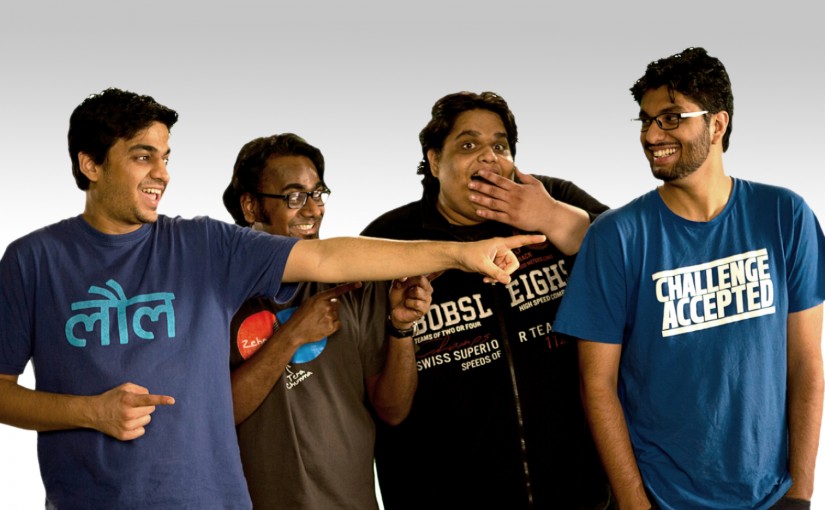Drop us a few lines about the task and we will get back immediately to see we how we can take the discussion forward. Alternately, just pick up the phone and speak with us at +91 9910034330 and we would be happy to help.
- - Do tell us a little about the nature of your business.
- - Be specific about what you’d like us to help you with.
- - Knowing your budget always helps us plan a suitable intervention.
- Blog
Social Media Marketing GPS – Twitter interviews with 40 market leaders
-
Social Media Marketing GPS – Twitter interviews with 40 market leaders
 An interesting experiment was conducted last summer by Toby Bloomberg, among the most eminent voices in the social media marketing and strategy space in US.
An interesting experiment was conducted last summer by Toby Bloomberg, among the most eminent voices in the social media marketing and strategy space in US.With the intent of putting together a business book using Twitter as the “major content platform and distribution channel”, she invited 40 social media marketing pros across the world to share their views through tweets on subjects ranging from ethics, tactics, research, metric, branding, sponsored conversations, blogger relations and more.
The outcome of the effort has been the launch of her e-book Social Media Marketing GPS – A Guide to Social Media, 1 Tweet at a Time.
The Chapter 5 of the book on “Strategy First” features an interview with Rajesh Lalwani, Founder and Principal Blogworks alongside BL Ochman, Managing Director of Emerging Media for Proof Integrated Communications, the digital marketing arm of Burson-Marsteller.
Who is this book meant for? In Toby’s words –
It’s a genre for the 24/7 marketers who don’t have time to read a tome but must understand social media in order to do their jobs. It’s for people who want insights and information bite-size and actionable. It’s for business professionals who want a quick refresher and innovative ideas to take their current strategy to the next level.
This book spanning over 12 chapters is currently available for a free download here
For those, who may want to get a quick flavor of what the book comprises, I have shared some of the thoughts from the book that resonate with me.
- SM brings back the “corner grocery store relationship” where business was built on trust. The grocer was part of the community.The grocer knew & cared about the people that purchased her products/services. SM helps create and nurture closer relationships
- Most successful SM strategies focus on a niche .. think the “long tail” concept. SM is the poster child for segmentation marketing
- Sometimes bottom-up forces the top to pay attention. SM on the edge can work to affect enterprise change
- Don’t be surprised if social media redefines who interacts with the customer to include departments that traditionally had minimal direct contact
On Social Media Research
- Social listening is not effective as a one shot tactic. To realize the benefits it must be incorporated as an on-going strategy
- Researchers now must come out from behind the 2-way mirrored room, share their M&Ms and engage in a dialogue with their customers
- Hearing the unfiltered conversations from your customers adds depth and emotional context to consumer insights that is frequently missing in traditional research
- Social conversation analysis is not just about the number of mentions. The focus should be on information that provides insights into: marketing goals/objectives, industry trends, customer service, competition, new product development, campaign buzz, etc.
On Ethics
- Social media users often struggle with ethics because many see SM as different from other media. It’s not. Ethics are the key to SM
- Sharing matters. SM isn’t about getting. It’s about giving & helping others. Those using SM just to get from others fail at SM
- Using tricks & tools to get more SM followers may add numbers but without engagement & trust, raw numbers mean nothing
On Strategy
- Without strategy social media marketing is simply a cool cocktail conversation topic and not a business decision. A resource dump
- As in any planning SM includes a budget process. Don’t be caught in the illusion that SM is free. Human capital, time & finances
- The tools may be free, but It costs money & requires specialized knowledge & experience to create an effective social media campaign
- No strategy means you are not really differentiating, you are merely copying what everyone else is… SM becomes a toy
- No SM strategy means that the brand/ org network is not really ready to act upon feedback, the backend is not ready, lip service
- No SM strategy means can’t measure because you didn’t set objective & goals! Also, you can’t celebrate success, for same reason :)
On Twitter
- Develop a Twitter strategy that includes defining your Followers, the extent of personal versus biz tweets, tweet name branding
- The Twitter Stream flows rapidly. The lifespan of a tweet is inversely proportionate to the number of followers in your timeline.In other words, the more people you follow, the less time a tweet will be visible on your Twitter page
- Marcom on Twitter is communicating *with* people, not *to* them. Use Twitter solely as broadcast channel & you will lose followers.
On Social media and branding
- Relationships built w/in SN do impact purchase decisions. Smart brands don’t blast messages they become part of the ecosystem.
On Widgets
- These grab-able pieces of code, sometimes called “virtual fridge magnets” often find their way into segments not thought about
- Widgets that only benefit the originating or parent company are perceived as glorified banner ads. Rarely do they get “grabbed
- Especially with social media tools, the temptation is to want to try out a shiny new tool just because it is shiny and new
What makes a brand “social media smart”
- SM pulls away the Wizard of Oz curtain to reveal true brand values/benefits and honest customer expectations. Relationships Rule
- Smart SM brands know that there’s a tendency to ignore interruptive/one-way push marketing (no matter how large their budgets are)
- Twitter is a perfect example of people’s comfort with the “BETA” economy – smart brands always work in “BETA” re: social media.
On Blogger Relations
- Most bloggers don’t answer to an editor. They write what and when they want. Content is personal & passionate. Readers are friends
- Remember what your mama taught you: Don’t lie. Don’t cheat. Don’t bully. Play nicely together. Say Thank you!
- Bloggers make it easier to figure out who they are, yet few marketers bother to invest the time. They’re obsessed with the “A-List”. Forget “A-List”. Find *your* List…30 bloggers who care abt what you do, who write abt what you do & who don’t mind being pitched!
- The secret sauce for the perfect pitch: relevance, respect, brevity, clarity and adding value.
On Measurement
- Give SM its due respect. Hold it to standards of accountability as you would any marketing strategy PR, research, advertising, etc
- People confuse value and return. Metrics that tap into the depth of social interactions are not ROI per se
- Well-worn paths in social science let us move beyond the “black box,” from a campaign to a community to social business
- We just need to shift our thinking to be open to more social constructs and value beyond the intended bottom line. We can measure the connections, conversation, and meta-communication
On Building relationships
- The secret power of SM is not in the search rankings or new channel messaging but the ability to build cross cultural relationships
- Organizations that only allow “biz talk” & not the personal give and take w/in SM may actually do their brand more harm than good
- “It’s not personal Sonny.It’s strictly business.” Son of the Godfather was dead wrong. Business is personal. SM makes it happen
- Businesses that “went global” in the 20th cent have an opportunity to get back to Mom & Pop shop style relationships using Soc Med
- Where you build a relationship is less important than actually building one. Build is a verb it means time & effort are involved
Do share if any of these resonate with you and your experiences/beliefs around the present and future of social media marketing.
Disclaimer: Views of authors are personal and do not represent the views of Blogworks, or any of its clients.
-
Contact
conversations@blogworks.in
+91-9910034330 -
Newsletter
-
Social

























